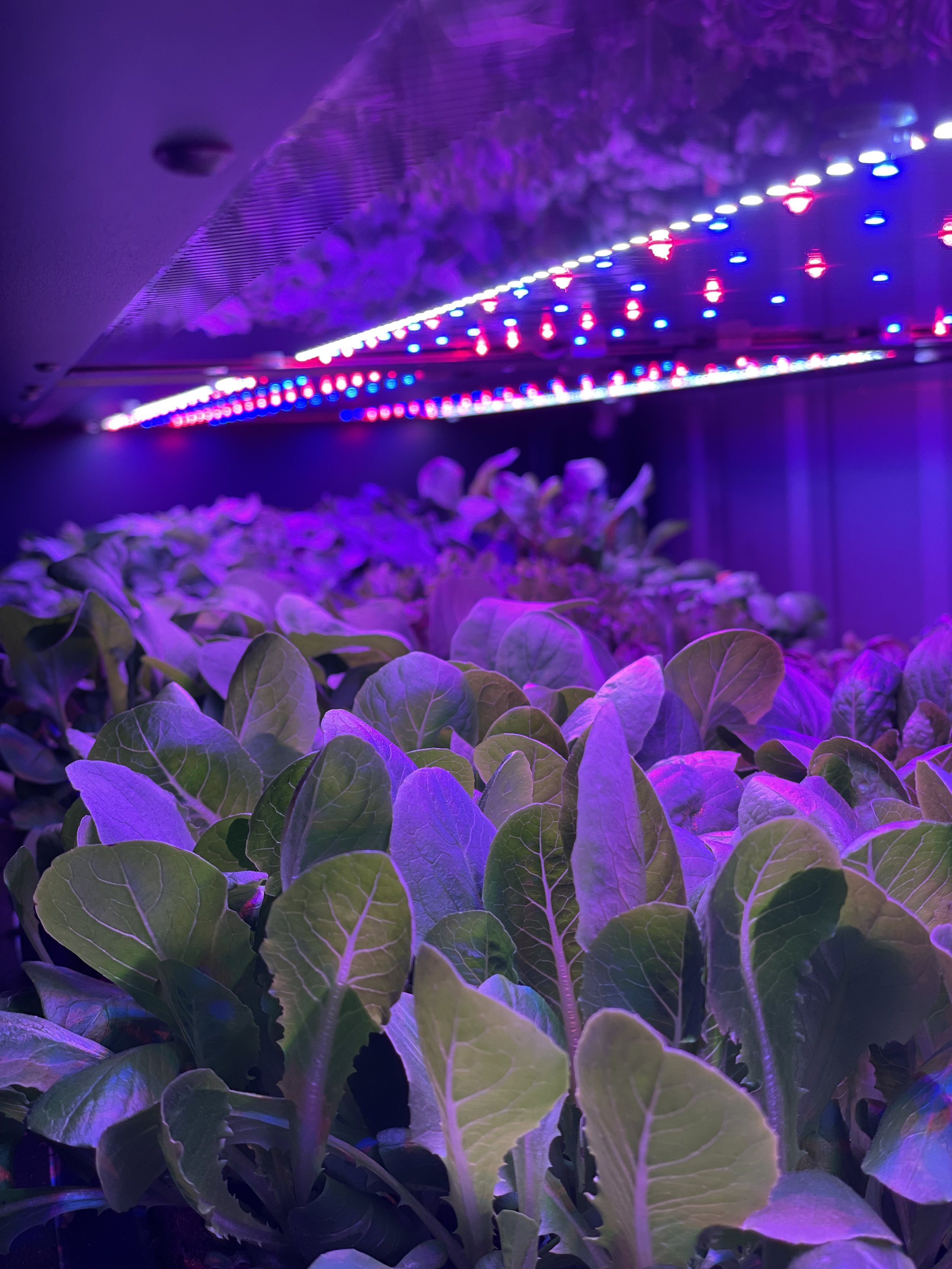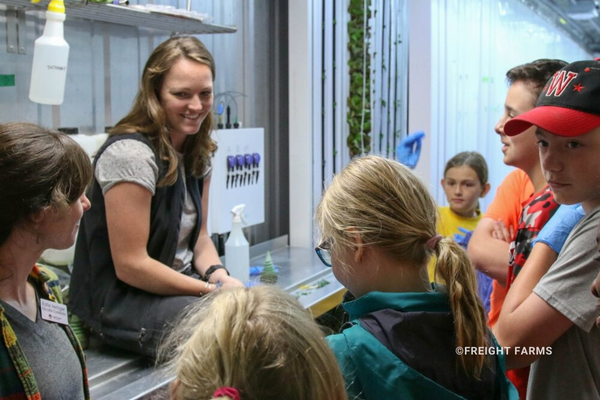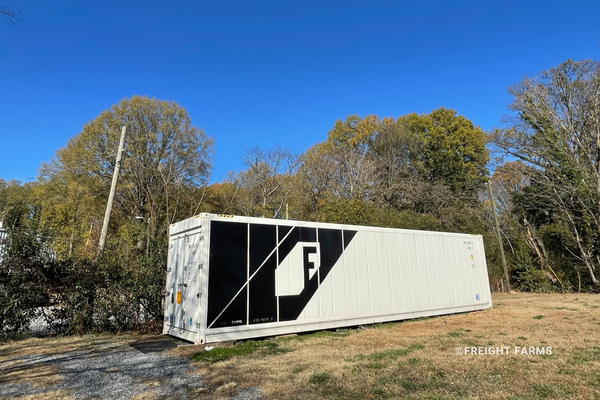
News About Farming in Shipping Containers & Limited Indoor Spaces
New Mexico State University - Are Container Farms Sustainable Growing Alternatives?
Near the entrance of a 40-foot container farm installed at New Mexico State University’s Grants campus, dozens of 4-day-old kale plants lined a horizontal nursery bed, sprouting at various lengths in shades of electric green from miniature patches of densely packed soil.
Further inside, instructor Gabriel Garcia flipped a switch. Instantly, red and blue LED lights engulfed the space, illuminating the intricate vertical farming system in a shocking pink glow.
“The lights mimic the sun,” Garcia explained on a July afternoon. “This is where we’ll move the kale when their root structures develop, and they’ll stay here until they reach maturity.”
Texas Health's 'Growing Good Food' Initiative Funds 10 Local Organizations
The organizations benefiting from this year’s grants represent a tapestry of North Texas neighborhoods, each working on a different piece of the puzzle to make food more accessible, nutritious, and affordable for all. From urban farms to food pantries, the "Growing Good Food" awards are planting the seeds of lasting change.
One of the standout winners is Tabor Farms, based in Fort Worth. With a mission to address food inequities, Tabor Farms will use its funding to repair its vital wellhouse, which pumps water from 650 feet underground, ensuring that the urban farm can continue irrigating its crops.
USA - FLORIDA: Entrepreneurs Return To Their Roots For New Events Venue Venture
As managing partner of the Club at Renaissance in Fort Myers, Rodney Poole had been a customer of Rosy Tomorrows Heritage Farm in North Fort Myers. So when he saw the farm listed for sale, he knew it was a strong possibility for the new business venture he and his wife, Stacey, wanted to undertake.
Rodney and his partners sold the Club at Renaissance, a low-density gated development, in 2022. He and Stacey had been looking to purchase an event venue, but the couple hadn’t found the right fit yet. The farm checked a lot of boxes both in terms of uniqueness and functionality, since it already had a restaurant on-site.
Rodney looked at the property the day after he first saw the listing, bringing along chef Wesley Robbins (who’s also Stacey’s brother). “And I think from that day, we knew we were going to own it,” says Rodney.
"Fresh Lettuce Sales Thrive in Curaçao"
Curaçao enjoys year-round sunshine and consistently moderate temperatures, which might seem ideal for cultivating fruits and vegetables. However, appearances can be deceiving. Take tomatoes, for example a tomato plant requires cool night time temperatures at certain stages of growth, but in Curaçao, night time lows rarely fall below 24°C. As a result, much of the horticultural sector relies on systems that allow for partial temperature control.
Ferdinand Bouwman, who had managed a rehabilitation center on the island for years and was seeking a career change about five years ago, also opted for a controlled growing system. After experimenting with a small-scale, self-designed aquaponics setup and spending countless evenings researching vegetable cultivation online, he became intrigued by a highly controlled approach: Freight Farms. This vertical farming system, developed by a Boston-based technology company, involves growing crops in a container.
NMSU Researchers Look to Container Farms as Sustainable Growing Alternatives
Near the entrance of a 40-foot container farm installed at New Mexico State University’s Grants campus, dozens of 4-day-old kale plants lined a horizontal nursery bed, sprouting at various lengths in shades of electric green from miniature patches of densely packed soil.
Further inside, instructor Gabriel Garcia flipped a switch. Instantly, red and blue LED lights engulfed the space, illuminating the intricate vertical farming system in a shocking pink glow.
“The lights mimic the sun,” Garcia explained on a July afternoon. “This is where we’ll move the kale when their root structures develop, and they’ll stay here until they reach maturity.”
The container farm was one of the first projects shepherded by NMSU’s Center of Excellence in Sustainable Food and Agricultural Systems, housed in the College of Agricultural, Consumer and Environmental Sciences.
Transforming Vertical Farming With The Greenery™
Vertical farming is revolutionizing how we grow food, offering solutions to challenges like land scarcity, water shortages, and the demand for fresh, local produce. Freight Farms' Greenery exemplifies this innovation, turning a standard 320 sq. ft. shipping container into a high-tech, efficient, and scalable farming solution.
What is vertical farming?
Vertical farming is the practice of growing crops in stacked layers, often integrated with controlled-environment agriculture (CEA). Unlike traditional farming, which requires vast horizontal land, vertical farming uses innovative techniques like hydroponics to grow plants upward. This approach minimizes land use, conserves water, and allows for year-round production in urban and rural areas alike.
Farewell to Brittany Weerts: A Year of Innovation and Growth at Purdue Student Farm
The Department of Horticulture and Landscape Architecture (HLA) bids a fond farewell to Brittany Weerts, who is concluding her tenure as Hydroponic Research Operations Administrator. Throughout her time at Purdue, Weerts has played a pivotal role in advancing the department’s controlled environment agriculture capabilities.
Petrus Langenhoven, Director of the Purdue Student Farm, reflects on Weerts’ remarkable contribution: “When I learned that a Controlled Environment Ag Facility was coming to the Purdue Student Farm, I knew we had to find someone experienced, self-driven, enthusiastic, passionate, and dedicated to managing the container farms and helping educate the next generation of growers. We were very fortunate to get Brittany Weerts to take on the role.”
Growing Minds: How Container Farms Enhance Social Emotional Learning in Schools
Hydroponic container farms provide a unique environment where students can engage in activities that promote SEL:
Unstructured Conversations: Tasks like seeding and harvesting create opportunities for meaningful dialogues between students and educators, fostering relationship skills and social awareness.
Collaborative Learning: Working together in the farm setting encourages teamwork, communication, and appreciation of diverse perspectives.
Problem-Solving: Managing farm operations requires critical thinking and responsible decision-making, skills that are transferable to various life situations.
Why Freight Farms Makes Pesticides a Thing of the Past
Pesticides have been a cornerstone of traditional agriculture, used to protect crops from pests and diseases. But their impact on health and the environment is increasingly under scrutiny. From chemical residues in food to harmful runoff polluting waterways, the "bad" of pesticides is clear. Yet, with Freight Farms' hydroponic solutions like the Greenery™, there’s a better way to grow—without pesticides.
New York State - Foothills Farm Is Scaling The Production Of Hydroponic Greens For New Markets
Looking back on their first full year of production, entrepreneurs Max and Nikki Poritzky have counted one ton of produce grown and distributed to restaurants and schools from their hydroponic farming facility, Foothills Farm, in Greenfield Center.
The farm is a 40-by-eight-foot container housing an efficient, vertical growing system that produces high quality lettuces and herbs using a fraction of the space of traditional farming.
The couple have backgrounds and careers in the field of nutrition and come from health conscious families, they said.
She studied nutritional biochemistry at UC Davis and was a commercial executive marketing dietary supplements, an industry in which Max also had an executive career spanning 25 years. He said his mother founded Wild Oats, the first health food store in Saratoga Springs.
“‘Let food be thy medicine’ might sound clichéd, but this is how our families live,” Max said.
USA-MINNESOTA: Hydroponic Farm Is High Tech Operation With Small Footprint
Unlike most farmers who walk outside the door to view their crops, Tony Rahe (pronounced Ray) of Rahe of Sunshine Farms in Wykoff walks inside a door to tend to his beds of lettuce.
Instead of horizontal rows of crops planted in black soil as far as the eye can see, Rahe’s crops are planted vertically in a clean, compact space fed by constant drips of water.
Rather than being at the mercy of nature with its unpredictable weather, Rahe’s operation runs on Wi-Fi as the growing conditions are monitored by his iPad around the clock so that he has uniform light, moisture and nutrients that vary little from day to day.
'We Really Are superior': Advantages of Hydroponic Farming in Urban Areas
“The plants grow without any pesticides, herbicides, period. We don't have to do that,” said Trevor Spear, the owner of Nanue’s Farm. “When you pull the lettuce off the panel, it is fresh to eat right now. No cleaning has to happen.”
Spear took up hydroponic farming as a hobby in retirement, and soon found an unexpected passion. When he started Nanue’s Farm in 2019, downtown Raleigh was one of the first to embrace hydroponic farming.
How To Market A Freight Farm Like A Pro
Are you looking to promote your Freight Farm and expand your customer base? Whether you're already operating a Freight Farm or planning to start, effective marketing strategies can help you connect with your audience, secure sales, and maximize your farm’s success. In this guide, we’ll cover expert techniques to market your Freight Farm, increase visibility, and grow your business.
This Salad Concept Grows its Own Lettuce Through an On-Site Hydroponic Farm
While farm to table restaurants are nothing new, not many operators source their own salad greens from right next door. Neon Greens is a newly opened quick-service salad restaurant in St. Louis, Mo., that operates its own 400-square-foot vertical hydroponic farm attached to the restaurant storefront.
The farm yields yield roughly three acres each of 80 different lettuces, all of which Neon Greens uses in its salads, from mizuna lettuce to sweet crisp lettuce.
The two hydroponic farms are in an ancillary room attached to the restaurant, and an elevated conveyor belt delivers the lettuce next door once it is harvested.
How Farm in the City is Transforming Puerto Rico's Food System
Puerto Rico imports nearly 85% of its food, leaving its food system vulnerable to disruptions like hurricanes, supply chain issues, and economic instability. Farm in the City Nowis tackling this challenge with a novel approach to agriculture franchising, building a network of container farms powered by sustainable, accessible technology. By blending modern farming techniques with local empowerment, FITC’s model isn’t just about growing food—it’s about fostering resilient communities and creating new economic opportunities across the island.
Farm in the City Now reimagines food production as a franchise system, where small-scale container farms are owned and operated by farmers and local entrepreneurs, yet supported by a cohesive network of resources, training, and technology.
This model, rooted in principles of sustainability and resilience, is a transformative solution that makes agriculture both profitable and accessible for local communities.
JJ’s Star Spangled Salute: A Navy Veteran Creates a Container Farm
Today, we salute Navy Veteran Brad Fourby. Brad had a dream and moved nearly 2000 miles away from Sacramento to Pittsburg, Kansas, to make the dream come true.
That dream is “Leafy Green Farms.” Using his military training helped keep Brad methodical in his approach to his dream, saying, “I knew I didn’t need to win the war today; I just needed to survive the battle.”
He planted his first seed on July 4, 2021. What he created inside a shipping container was vertical rows of produce in a hydroponic growing environment that now serves area food deserts as well as 10 different farm classrooms and school districts to inspire future farmers.
Overbeck Controlled Environment Agriculture Facility
This spring, two shipping containers designed to be vertical farms were delivered to Purdue University to offer students, staff, faculty and the community to learn and experiment with new horticulture and agricultural practices.
"The student farm is all about offering our students experiences in many different angles to production. So, the Overbeck Controlled Environment Agriculture Facility project was a great fit. We are excited to educate our students how to operate a container farm. With many students excited by new technology, we have seen great interest in these container farms and the learning opportunities they can provide."
USA: Urban Hydroponic Farm Debuts in Chelsea, Massachusetts
A new hydroponic freight farm opened in Chelsea on Saturday, providing fresh produce year-round. The urban farm was launched by GreenRoots, a local environmental organization.
Roseann Bongiovanni, executive director of GreenRoots Teaching Kitchen, said the farm's hydroponic technology will let the organization grow produce year-round. “It’s a sort of urban farm-to-table concept to address food insecurity, nutrition, health, and also to build community and culture,” Bongiovanni said.
On the outside, the farm just looks like a storage container in a parking lot. But inside the container, water and artificial light and heat create an environment for plants to grow no matter the weather outside.
VIDEO: What If We Built Vertical Farms?
As our population grows, we're going to need a lot more farms to feed the planet. Yet, in a lot of places, farming is almost impossible. And much of the land we can use for farming is disappearing.
With so many farms on land, could we build farms vertically to save space? Maybe it’s time to grow ... up?
Where do we need vertical farms?
What would it take to build them?
How could they help to save the planet?
USA - WYOMING: CWC's Container Farm Arrived at Lander Center
“We are excited to have new technology on campus so our students can learn about these alternative high-tech farming practices,” says President of Central Wyoming College. “It is cutting edge and has major implications for substantially increasing food production in small spaces, and for bringing fresh foods to food deserts that have little or no access to these healthy and fresh food options.”
CWC’s AAS Degree in Regenerative Small Scale Farming is the first of its kind in Wyoming. Central Wyoming College also offers a Bachelor of Applied Science degree in Organizational Management and Leadership with an option in Agricultural Leadership.





















